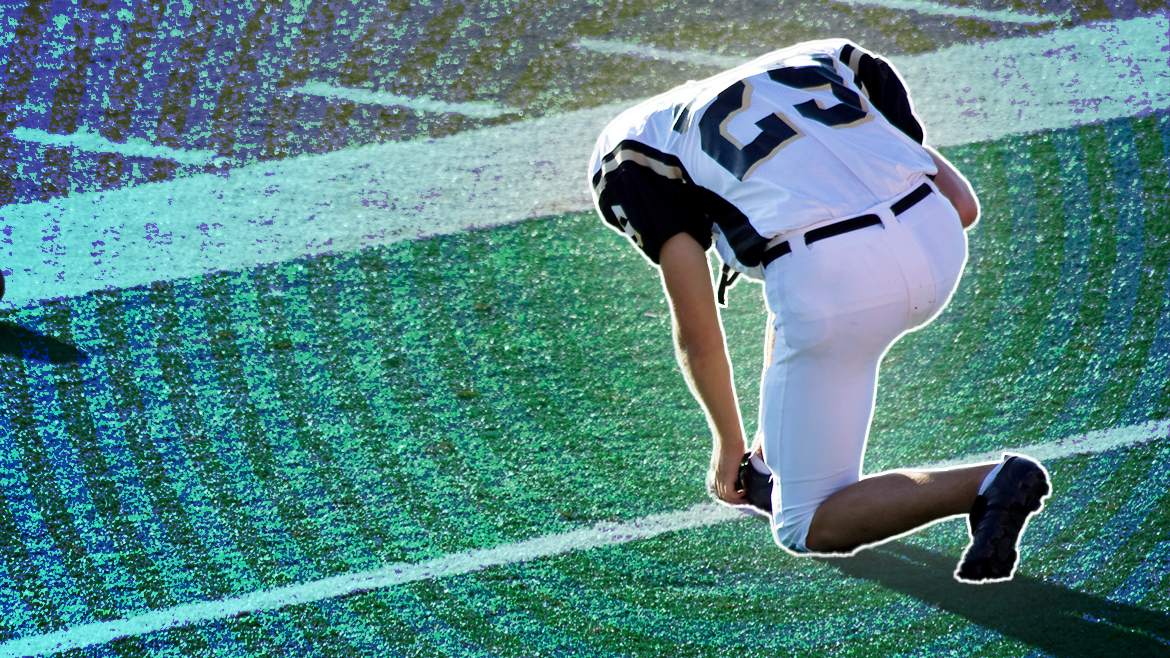“The 360” shows you diverse perspectives on the day’s top stories and debates.
What’s happening
A high school football coach’s postgame prayers at the 50-yard line have inspired a legal dispute that could prompt the Supreme Court to redraw the lines that dictate what kinds of are allowed by public school employees.
The First Amendment guarantees every American the right to freely exercise their religion. It also prohibits the government from establishing a single faith. At times those two rights come into conflict, prompting a question that the court has wrangled with through the decades: How much freedom should government workers have to exercise their own faith before their actions violate the rights of citizens not to have a religion imposed upon them by the state?
Generally, the court has ruled in favor of limiting expression by public employees in order to prevent government promotion of one faith over another. That’s why, for example, teachers aren’t allowed to lead prayers in public schools, even if they’re voluntary.
But late last month, the Supreme Court heard arguments in a case involving , a former assistant football coach at a public high school in Bremerton, Wash. During his eight years as a coach, Kennedy regularly held prayers in the middle of the field following games — often with players joining him. The local school district became aware of this practice in 2015 and ordered him to stop, under the belief that it violated the separation of church and state.
Kennedy continued to pray after games. He also retained lawyers and made repeated media appearances to promote his . The added attention eventually created a spectacle that culminated in a dangerous “stampede” of people rushing onto the field after Bremerton’s homecoming game. Kennedy was placed on administrative leave two weeks later for defying the district’s orders. His contract was not renewed for the following season.
Why there’s debate
Lower courts ruled against Kennedy on the basis that the school district had a compelling interest to prevent him from promoting a particular religion while working as an agent of the government. But the Supreme Court’s conservative justices appeared to be more sympathetic to the argument that Kennedy’s right to free expression was violated, according to legal experts.
Backers of Kennedy’s case say his midfield prayers were purely a personal expression of his faith and in no way an official endorsement of religion on the part of a government employee. They emphasize that he never required players to participate and initially prayed by himself before players chose to join him. In their view, denying Kennedy the ability to perform a simple, non-coercive act of faith represents a clear violation of his freedom to express his religion as outlined in the First Amendment. Others take a broader view, arguing that — beyond this specific case — the law is far too restrictive when it comes to government employees’ right to practice their personal faith.
Critics argue that it’s inaccurate to say that Kennedy’s prayers were entirely personal, considering the amount of attention he purposefully invited to the ritual and his refusal to accept accommodations that would have allowed him to pray in private. They also make the case that even though Kennedy never mandated players to join him, his position as an authority figure created pressure for them to comply out of concern they might fall out of his favor or be seen as an outcast by teammates. Some left-leaning legal analysts believe the Supreme Court’s conservative majority, which has shown a tendency to favor religious freedom over other rights in recent cases, may be eager to throw out past rulings on prayer in schools and create more room for explicit endorsements of a single faith — namely, Christianity — by school employees.
What’s next
Most experts expect the court to side in Kennedy’s favor, but the importance of the decision will depend largely on how broad their ruling ends up being. A narrow ruling might produce only a small carveout for actions similar to Kennedy’s postgame prayers. A more sweeping decision could fundamentally rewrite laws on religious practice in schools and give teachers, staff and coaches substantially more leeway to openly express their faith in the classroom and on the field.
Perspectives
School employees are people, not just agents of the government
“Combine a doctrine that deprives teachers of any freedom in their teaching with a school district that declares that virtually any public speech at school is professional and not personal, and you create a legal environment that treats teachers as pure instruments of state expression, required to spout only state-approved ideas from the moment they walk onto campus until the moment they leave.” — David French,
The young players, not Kennedy, are the ones who had their religious freedom violated
“Teachers, coaches, administrators, counselors, office staff, and even volunteers already have the right to pray while on duty and wear religious jewelry or clothing. What people of faith in government service should not do is violate their constituents’ religious freedoms by using the authority of their position to pressure students into prayer.” — David Williamson,
When rights come into conflict, religious freedom should take priority
“Americans across all political identities may not agree on many cultural touchstones, but the majority of us, even as we have become more secular as a society, have still looked at religious freedoms as our societal glue and one of the foundations of our exceptionalism.” — Salena Zito,
Kennedy’s prayers were far from a solitary expression of faith
“The photographic evidence shows that once Kennedy had made himself into a cause célèbre, he was joined on the field by players and fans alike, some of the latter in a stampede that injured a number of bystanders. I’d say that turning the postgame handshake ceremony into a raucous revival is well over the line. You may disagree.” — Mark Silk,
It’s absurd to argue that Kennedy was acting on behalf of the government
“The notion that allowing Kennedy to pray would amount to an official endorsement of religion, which persuaded the panel, seems implausible to me. The endorsement test asks whether an objective observer, familiar with the context, would think that government action signals favor or support for religion. … Surely, someone who knew the whole story would understand precisely that the school district greatly disapproved of Kennedy’s conduct and that the last thing it wanted was for Kennedy to keep praying in public.” — Mark Movsesian,
The court is primed to let public employees openly preach while on the job
“While the weight of established law should crush Kennedy’s case, the biggest open question in Kennedy is most likely to be just how much leeway the Court will give public school teachers and coaches to preach their religious beliefs to their students.” — Ian Millhiser,
It’s reasonable to open up a small amount of space to allow simple act of worship
“While the conservative majority appeared on Monday to be largely sympathetic to the coach, justices thankfully did not at all seem prepared to craft a decision that would turn the so-called establishment clause on its head. A narrow, targeted ruling would seem to be in order.” — Editorial,
The case is part of a much larger movement to impose Christian values in public spaces
“The case erases the rights of children who wish to avoid religious coercion at school, fixating instead on the right of school officials to practice their religion during the course of their formal duties. It is the culmination of a decades-long battle to reframe government neutrality toward religion as unconstitutional discrimination against people of faith. And it is chillingly likely to succeed.” — Dahlia Lithwick and Mark Joseph Stern,
Banning Kennedy’s prayers outright was a major overstep by the school district
“If there are legitimate concerns that a teacher’s or coach’s constitutionally protected religious activity might subject students to religious coercion, there are surely ways for a school district to address those concerns without violating the Constitution.” — Ed Whelan,
Kennedy is afforded sympathies non-Christians would likely never enjoy
“We’re talking about Christians here. If you think the conservative justices would have the same sympathy for a coach using a school event to hold Muslim or Hindu prayers, you don’t know much about this court.” — Paul Waldman,
Precedents on religious speech are so complicated, it’s hard to know where this case should fit
“On the surface, the question is simple: Can the public high school coach kneel and pray silently on the 50-yard line after games? But the doctrine the court has created over the years is so complicated and confused that you would be hard-pressed to make any sense of the debates without a law school course on the First Amendment under your belt.” — Noah Feldman,
Is there a topic you’d like to see covered in “The 360”? Send your suggestions to the360@yahoonews.com.
Photo illustration: Yahoo News; photos: Getty Images



